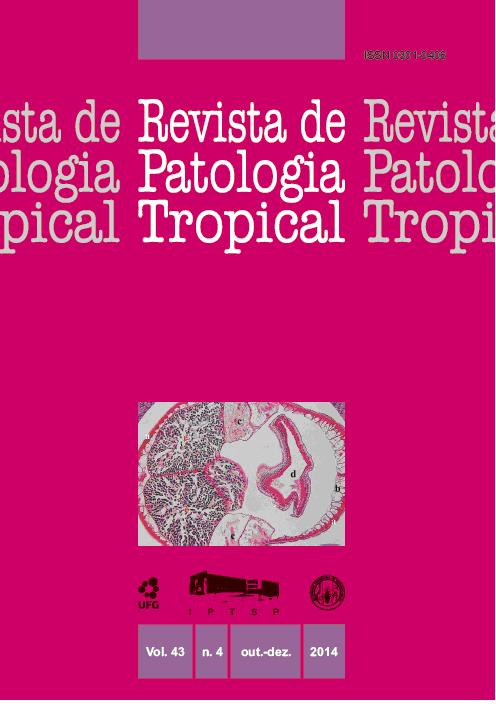EPIDEMIOLOGIA DA ESQUISTOSSOMOSE NO LITORAL DE PERNAMBUCO
DOI:
https://doi.org/10.5216/rpt.v43i4.33607Palavras-chave:
Esquistossomose, epidemiologia, saúde ambiental, analise espacialResumo
A expansão da esquistossomose para o litoral de Pernambuco vem sendo registrada desde 1992 com a detecção de casos agudos da doença em indivíduos de classe média/alta. Para diagnosticar este novo cenário de transmissão da endemia em localidades turísticas na orla marítima do estado é de fundamental importância o conhecimento prévio da distribuição georreferenciada das espécies de moluscos vetores, por meio de mapas que apontem sua exata localização, assim como é necessário espacializar as situações de risco biológico e as condições ambientais insalubres. Nos períodos de 15 a 18 de setembro de 2008 e 10 a 13 de setembro de 2013 foram realizadas caravanas expedicionárias, por epidemiologistas e parasitologistas por 11 municípios do litoral do estado, percorrendo todas as coleções de água doce distantes até 2 km da beira-mar. Os dados foram georreferenciados para posterior condução de análises espaciais. Para identificação da positividade dos exemplares de Biomphalaria glabrata, foi utilizada a técnica de exposição à luz. Os espécimes de B. straminea que permaneceram negativos até o 15º dia foram submetidos à técnica de diagnóstico molecular (PCR-single tube). Nas coletas de 2008 foram capturados 3.392 caramujos B. glabrata e 725 B. straminea, cujas taxas de infecção variaram entre 0,9% a 22,2%. Em 2013, foram coletados 948 B. glabrata e 504 B. straminea e somente foram encontrados caramujos eliminando cercarias na localidade Porto de Galinhas com taxa de infectividade de 81,4%, permanecendo como localidade de maior risco para transmissão da esquistossomose.
Downloads
Downloads
Publicado
Como Citar
Edição
Seção
Licença
The manuscript submission must be accompanied by a letter signed by all authors stating their full name and email address, confirming that the manuscript or part of it has not been published or is under consideration for publication elsewhere, and agreeing to transfer copyright in all media and formats for Journal of Tropical Pathology.

